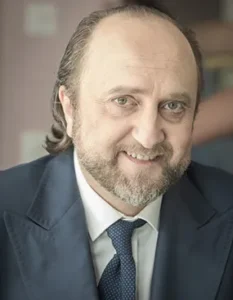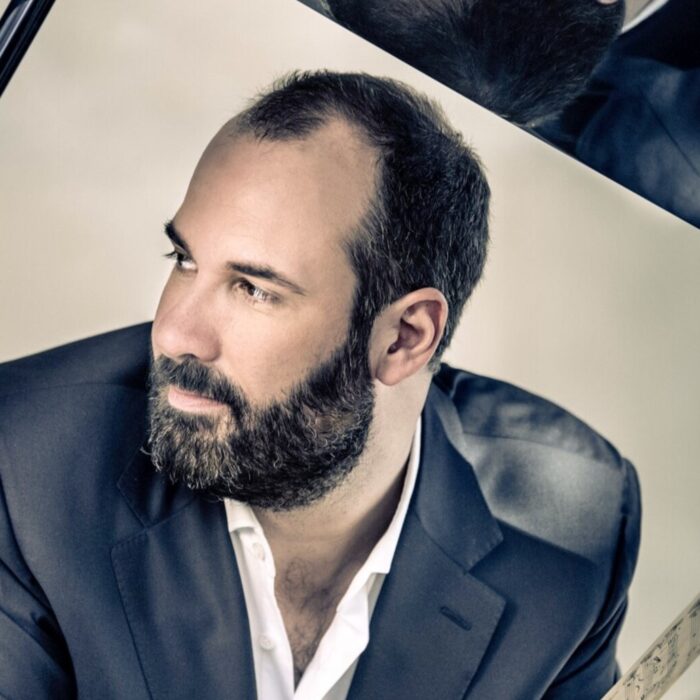
Q & A: Leonardo Galeazzi on Macbeth at the Blackwater Valley Opera Festival
By Francisco SalazarThis past weekend the Blackwater Valley Opera opened its season with a new production of “Macbeth” celebrating its 13th anniversary.
In the cast, Leonardo Galeazzi is making his role debut with the title character. It marks his third Verdi role after performing Germont in “La Traviata” and Iago in “Otello.” Throughout his career, the baritone has performed in Lyon, Naples, Bergamo, Milano, Florence, and many other cities.
Now as he performs the role the daunting role of “Macbeth,” Galeazzi spoke to OperaWire about the challenges of Verdi’s villain and the what it is like to collaborate with the Blackwater Valley Festival.
OperaWire: You will be singing the role of Macbeth. Can you tell me what excites you about singing this role at the Blackwater Valley Festival?
Leonardo Galeazzi: I am thrilled to debut this role in such an important festival, where I am returning for the third time, a festival that I have therefore seen grow over the years and where I feel at home. In addition, Lismore Castle offers an exceptional natural setting for this particular title.
OW: This is one of the most demanding baritone roles in the repertoire and it is a title role. What is the biggest musical challenge?
LG: The biggest challenge is to honor the dramaturgy, of both Verdi’s and the librettist, but also Shakespeare’s, by assimilating all the interpretive, dynamic, agogic indications, which are not mere symbols or simple captions on the score to be learned by heart, but rather represent the key Verdi offers us to best render the very multi-polar psychology of a character like Macbeth. The difficult job is to filter these cues through one’s own sensitivity and vocal instrument.
OW: How do you get into Macbeth’s psychology? He is a villain but at the same time a victim. How do you express these different qualities in the character?
LG: Macbeth is certainly ambitious but too loyal to the king to be evil. Yet the witches’ visions make him shudder: it is the germ of wickedness, the dark side that dwells in each of us and which the lady manages to bring to the surface, convinced that power must be won without scruples. To express this psychological state requires a great deal of empathy, drawing on one’s own experience if necessary; all of us sooner or later come to terms with our dark side, perhaps not necessarily going as far as murder, but in the various stages of life perhaps we are influenced by strong personalities, we perform more or less disloyal acts inspired by great ambitions. It is necessary to come to think as Macbeth would think, to be Macbeth during those 3 hours.
OW: How do you see the relationship between Macbeth and Lady Macbeth. There are multiple moments in the opera with the two characters in the drama. How do you think Verdi enriched the relationship and what does Macbeth think of his wife at the end of the opera?
LG: I see a relationship characterized by a strong imbalance; it is the typical situation where from the outside one would say ” behind a great man is a great woman.” In this case, the meanings are all in the negative, because we know what evil deeds Macbeth has been guilty of. It is also a toxic love, for while it is true that the soldier Macbeth is a loyal man of high ideals, in contrast, King Macbeth has a deviant personality, shaped by the Lady in his image. Verdi enhances this bipolarity in the duets and scenes in which they are together, where Macbeth is often insecure (E se fallisse il colpo?), or remorseful to the point of having visions during the toast; in contrast, the Lady appears resolute, cynical, and straightforward to her goal. Insecurity is the element that crumbles Macbeth’s power; he relies on superstition, going back to the witches to “end the veil of the future;” thinking to consolidate his authority. Eventually, with the Queen’s death, Macbeth feels permanently extinguished, bereft of his guidance, and goes to meet his own fate.
OW: What is your favorite moment in the opera?
LG: The prophecy scene, where we are witnessing a real duet. The witches we know are the third main character in the opera. The music and libretto are of bursting power, and a great acting performance must be given. The dark atmospheres, tempo changes, sudden lightning, thunder, and noises from underground create real special effects. All this has a strong emotional impact on me and I try to live those moments to the fullest.
OW: How does this role compare to other Verdi roles?
LG: I can give a partial answer because for now, I have only sung Germont and Jago. I believe it is a role where the required acting and musical/vocal skills are in balance, as demonstrated by the fact that Verdi in some passages abandons the so-called “closed form” or “the usual form” which often “plastered;” the repertoire of the time scene with the sequence RECITATIVE, TEMPO D’ATTACCO CANTABILE, TEMPO DI MEZZO, CABALETTA 1 – CABALETTA 2, STRETTA FINALE, and inevitably exacerbates that “improbability” typical of opera.
Instead in “Macbeth” there is a sprout of formal freedom that we will see again in “Otello” and “Falstaff,” a freedom that in my opinion proposes a more modern concept of “recitar-cantando.” This is why I feel that the musical, vocal, and acting aspects must be equivalent.
OW: Tell me about your working relationship with Serenad Burcu Uyar, Killian Farrell, and Sarah Baxter.
LG: With Serenad we have known each other for some years; we have done “Traviata” and Offenbach’s “Les fées du Rhin” together. She is a good friend and absolutely an anti-diva, and a colleague whose technical solidity and interpretive temperament I greatly admire. With Killian and Sarah, we are now getting to know each other for the first time and are working very well. We analyze every musical and scenic aspect and we compare a lot of notes. Each of us has “done our homework” before arriving here, thinking about an interpretative key. Now we need to discuss and make the best of our ideas and we are doing it with great serenity. In general, we have all placed ourselves on the same level without hierarchies, to get the most out of this music, this drama, and ourselves.
OW: What new elements does Sarah Baxter introduce into the production?
LG: Let’s say that these days it’s already interesting that a director starts from what the libretto says. This is new even though it should be a rule. With Verdi, there is no possibility of finding ambiguity because the score is stuffed with precise directions, intentions, and emotions that leave no room for other interpretations. With Sarah, we analyze sentence by sentence, word by word, the libretto and the captions, and from each scene, we try to draw the most interesting intentions, nuances, relationships between characters, and psychological implications.
OW: How has your interpretation evolved over the years?
LG: I have played brilliant and comedic roles for most of my career. Due to a certain versatility and also out of personal curiosity, I
often make inroads into the more serious repertoire as well. I resumed studying at a mature age and I fell in love with ancient Latin comedy, I found great similarities between Italian comedy and modern comic theatre. Ancient Greek and Latin theater are the parents of everything. I have always been inspired by Italian and international cinema and theater actors, avoiding falling into imitation, but trying to find my own style suited to my physical and somatic characteristics, thanks also to discrete gymnastic skills that some directors have exploited on stage (in an “Elisir d’amore” where I sang Belcore I entered the scene on a bicycle and descended by jumping). I’m also curious as to what else I could do with this voice, other than Opera. Sometimes in concerts, I insert songs by Domenico Modugno, if I can one day I would also like to have fun with some blues by Elvis Presley, but in reality, my dream would be one day to duet with a great rock & roll idol of mine who is Robert Plant, but we are in the field of unrealizable utopias.


